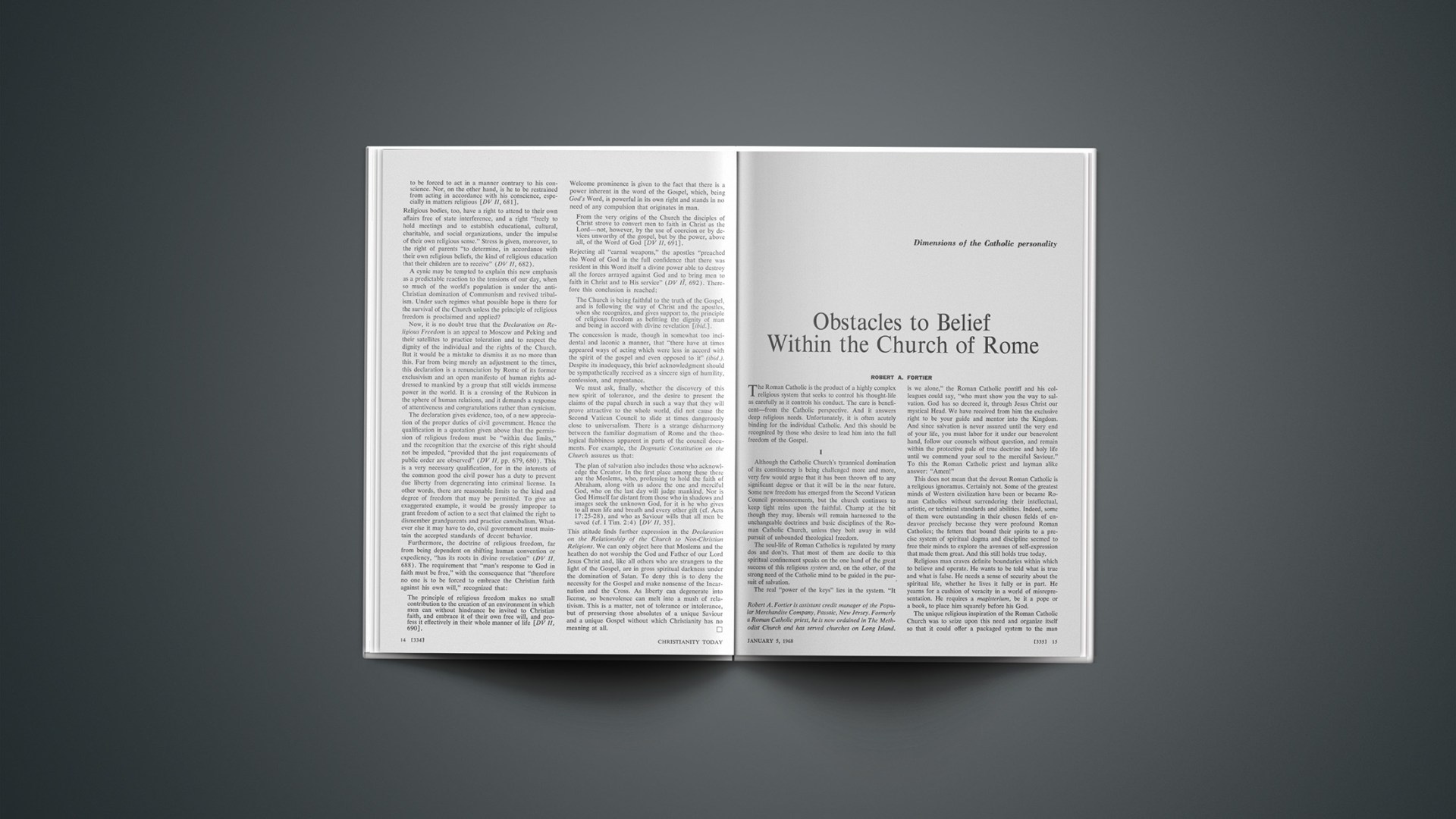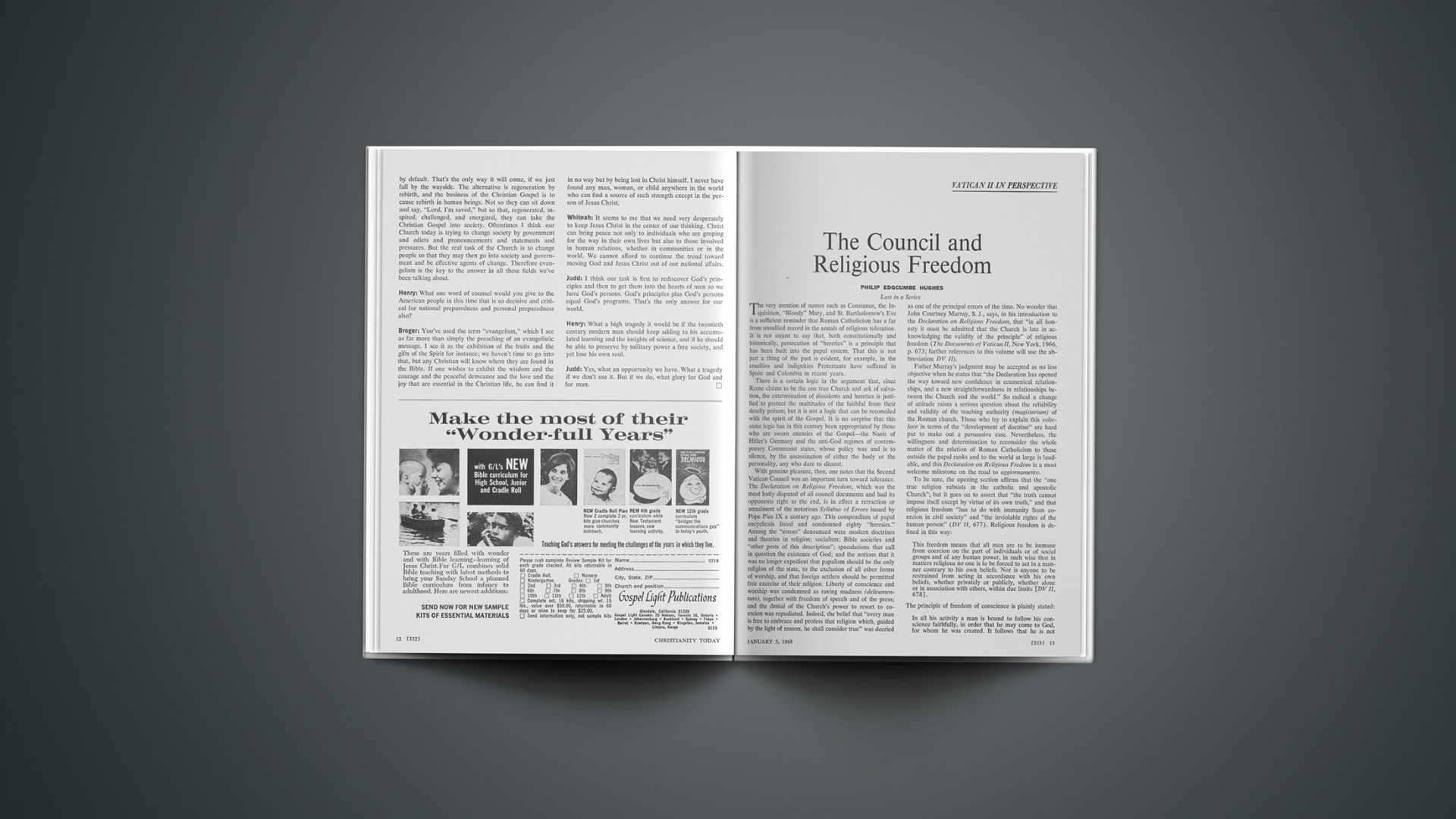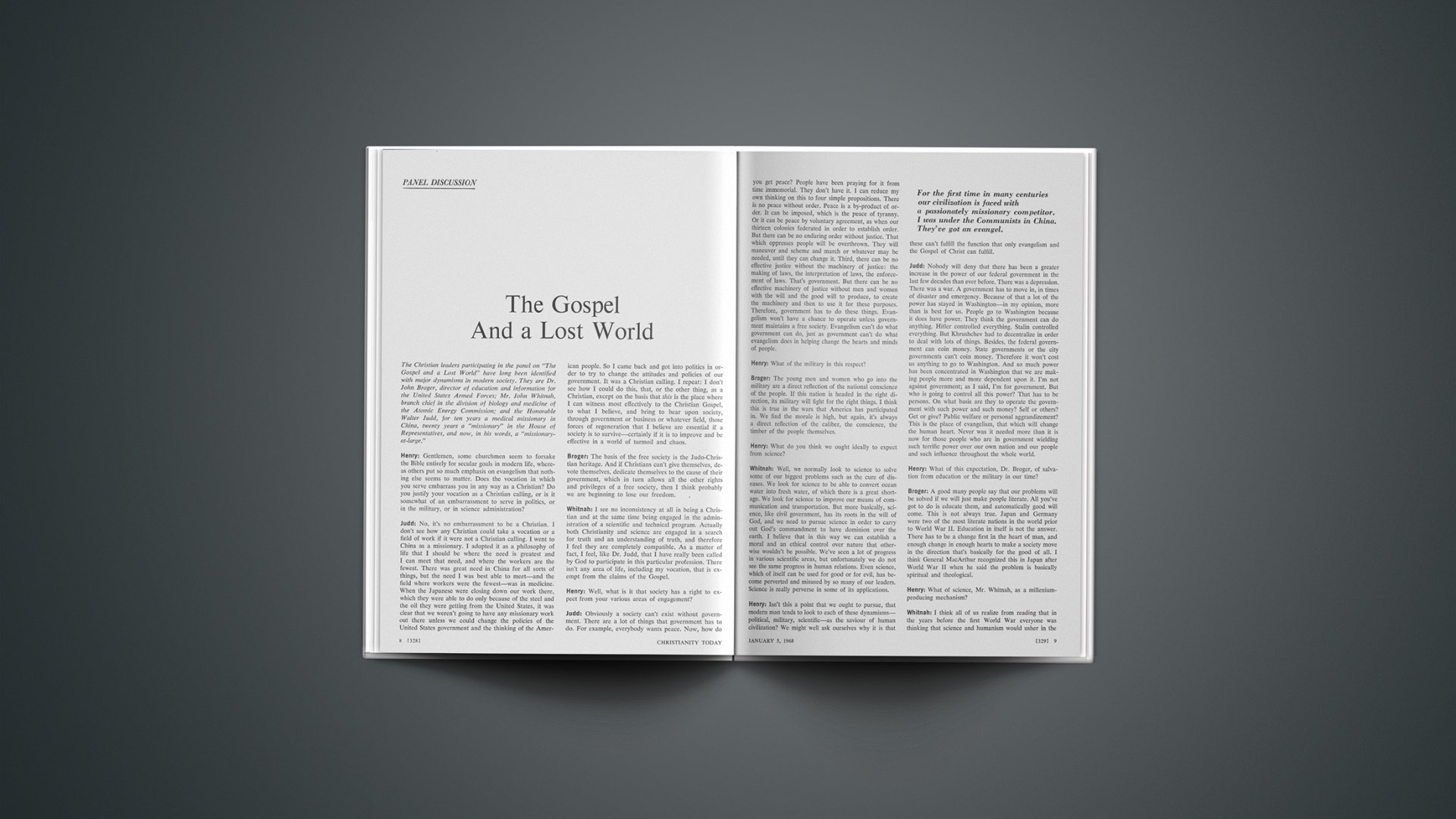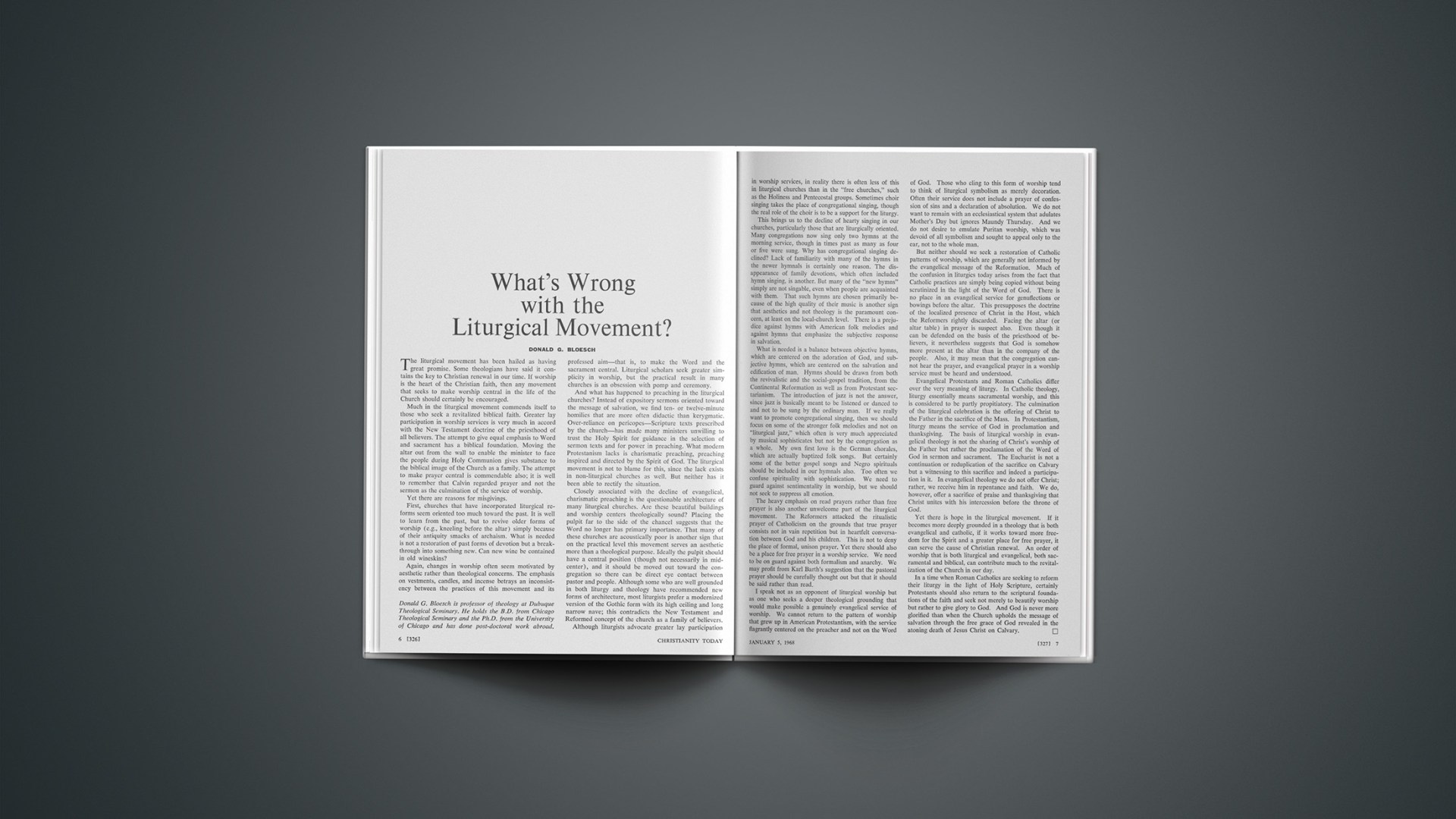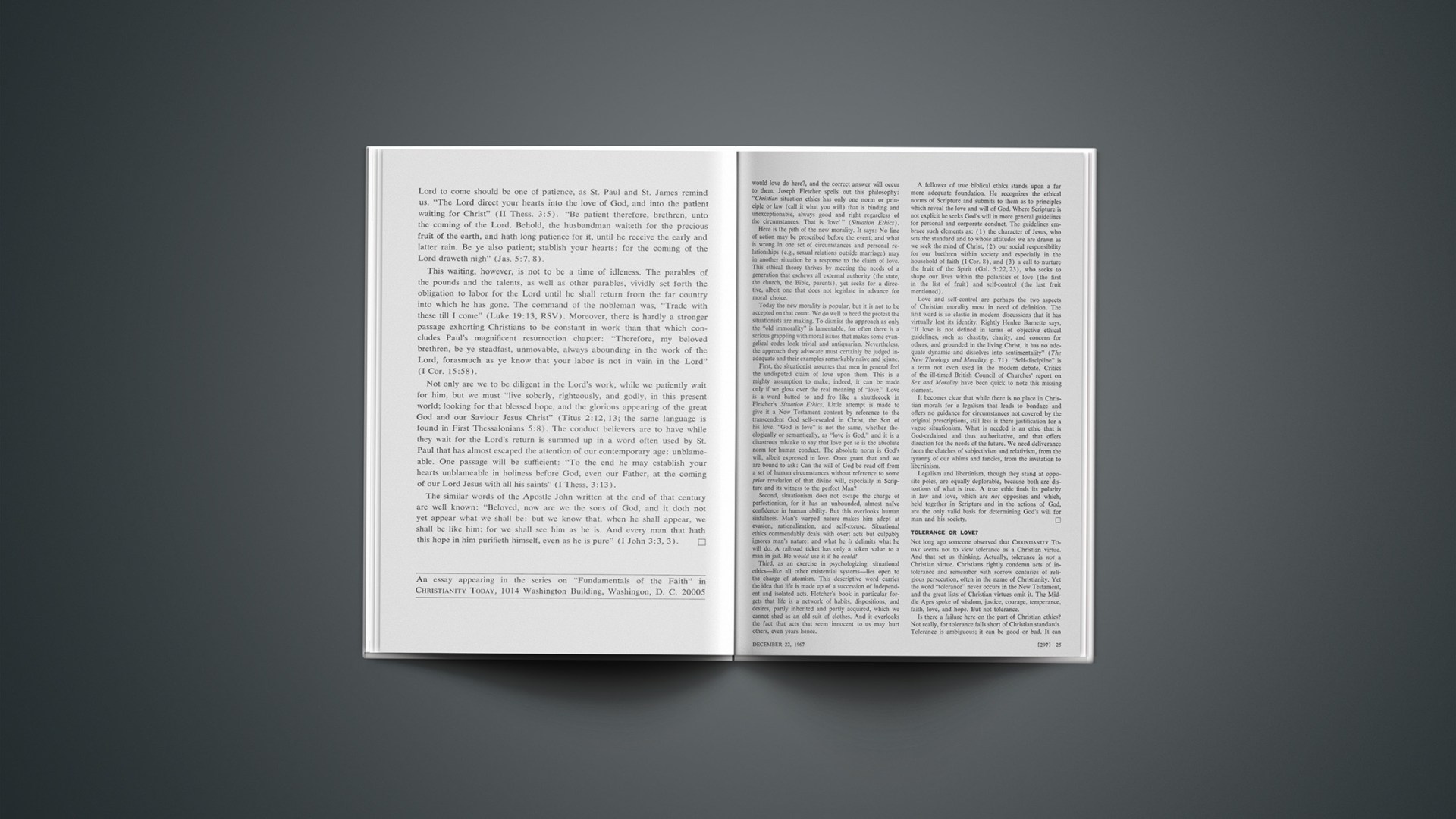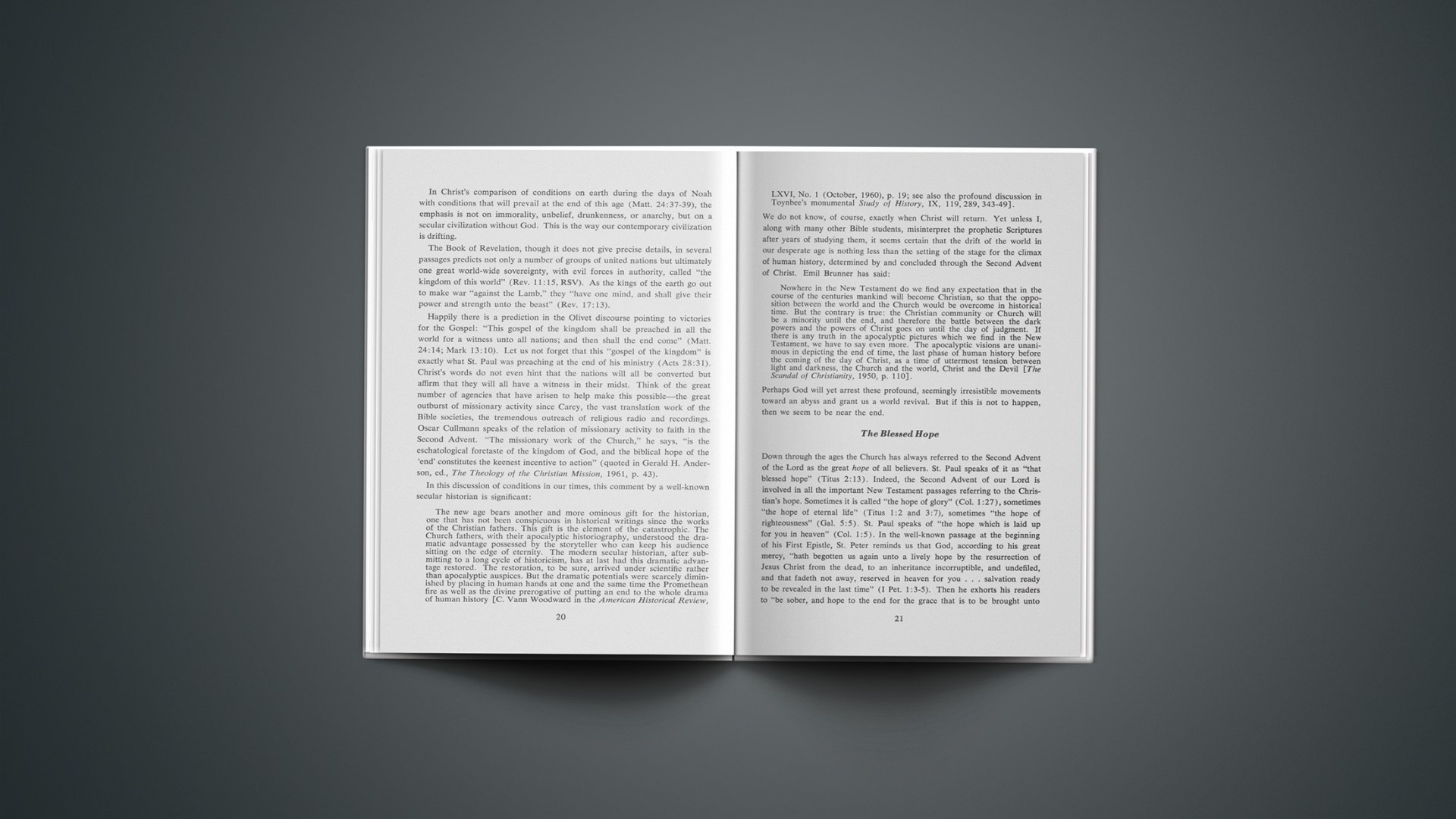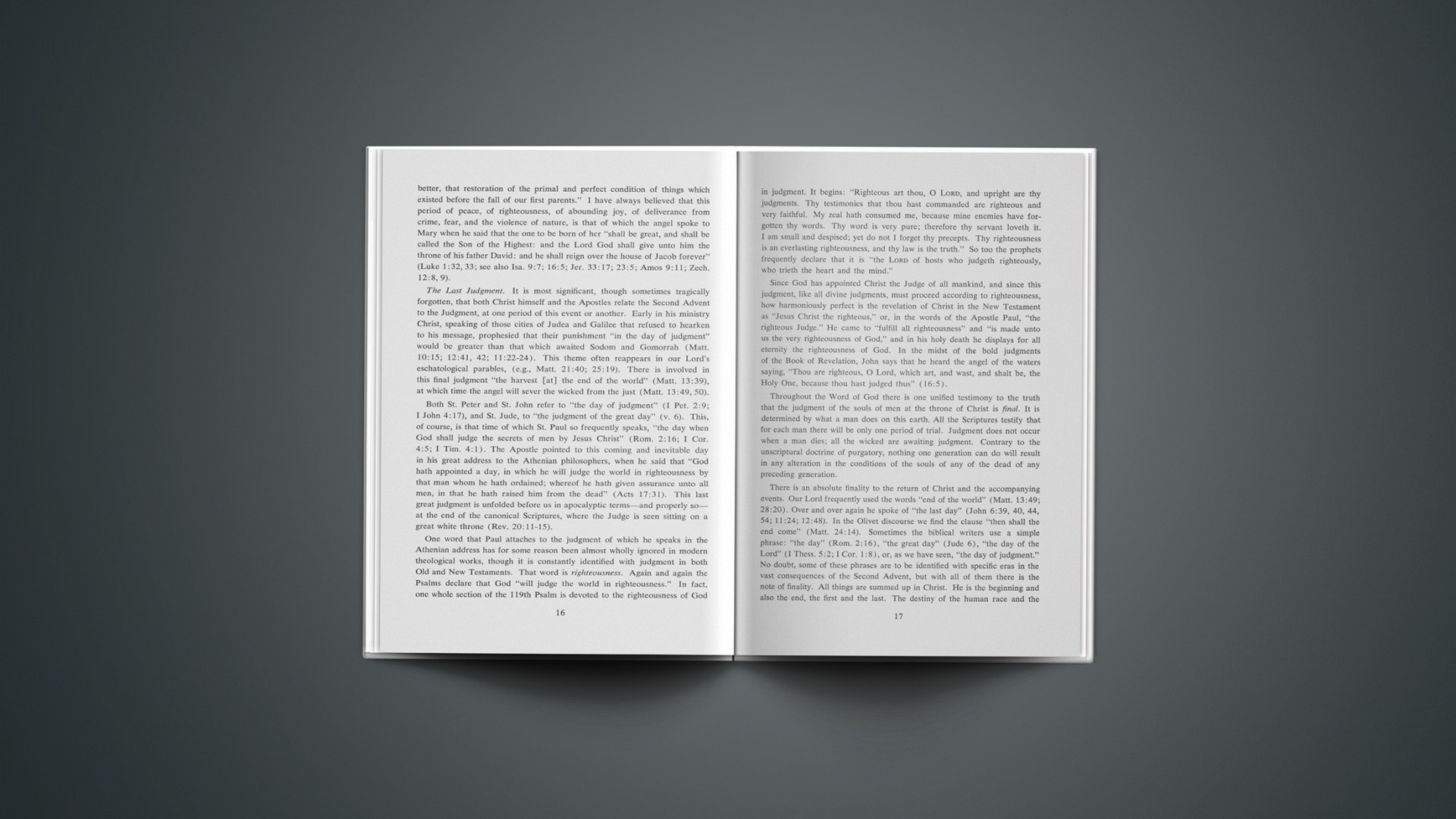Dear Patrons of the Sinema:
If you have been listening to our theological pundits, you must know that modern man has now passed through ontological adolescence and entered secular maturity. Thus the “now” Christian minister must make special efforts to relate his sermons to man’s secular life. One effective way he can show his awareness of our uptight world is to filch his sermon titles from movie marquees. By matching a biblical text with a magic title from the silver screen, a pastor can show he is a bona fide member of the “new breed” and also produce a cinesermonic spectacle guaranteed to draw SRO crowds. Check these titles and texts:
Up the Down Staircase—Jacob’s dream of the ladder with angels ascending and descending on it (Gen. 28:12).
A Funny Thing Happened on the Way to the Forum—Paul’s snakebite en route to Rome (Acts 28:1–6, 15).
What’s New, Pussycat?—Daniel in the lion’s den (Dan. 6:16–24).
Fantastic Voyage—Jonah’s submarine whale cruise (Jonah 1:17–2:10).
Gone with the Wind—The Church’s ecstatic experience on the Day of Pentecost (Acts 2:1–13).
The Dirty Dozen—The apostles before their conversions (Mark 1:16–20, etc.).
You Only Live Twice—Jesus’ conversation with Nicodemus (John 3:1–12).
Room at the Top—Moses in the cleft of the rock on Sinai (Exod. 33:22).
Separate Tables—The money-changers in the Temple (John 2:14, 15).
How to Succeed in Business Without Really Trying—Joseph’s rise to prominence in Egypt (Gen. 41).
Waterhole #3—Isaac’s well-digging at Rehoboth (Gen. 26:17–22).
Two for the Road—Paul and Silas’s split from Barnabas and Mark on a missionary journey (Acts 15:36–41).
Reflections in a Golden Eye—Israel’s worship of the molten calf (Exod. 32:4–6).
For that service when you want to survey the entire Bible, why not promote a double feature: A Man and A Woman and Blow Up! A word of caution: Remember to mention which of your cinesermons are suitable for mature audiences only.
See you Sunday Night at the Sermon,
EUTYCHUS III
OF EAST AND WEST
Thanks for the article by George N. Patterson, “Christ and the Asian Mind” (Dec. 8). It’s about time a respectable evangelical periodical … should touch on this major theme.… Mr. Patterson has done well by pointing out some of the main issues. However, there lacks necessary challenge for Western missionaries to alter their old colonial ways.…
Missionaries (evangelical) continue to deliver the Christian message within the package of Western culture. They do not seek to discriminate the truly biblical from the Western historical. Many of them lack historical perspectives of their own form of Christianity. They do not express serious desire to understand Asian culture, but continue to view Asian culture through Western cultural perspectives; they even sometimes force the converts to do the same.…
It is not untrue that many Asian believers suffer what we may call “cultural non-identity” or “cultural confusion.” Colonialism when practiced within the Christian missions can find no biblical justifications.… As the promise of Abraham is for all nations, and Jesus’ promise is for all the nations, and believers are being gathered from all nations, true biblical Christianity knows no difference set by nationality or race.…
Conversion is, of course, the primary goal of missions, but the converted one must challenge every area of his life … and so challenge his culture.… It is in this context of continuous challenge of the Christian faith within the Asian culture that Asian theology must and will develop. It is my prayer that the resultant theology so developed may be more biblical than has been developed in the Western history—and this will be so if both Western missionaries and Asian Christians will constantly take the Bible as the source, the content, the method, and the criterion, of theology.
JONATHAN CHAO
Chinese Fellowship for Christian Studies
Philadelphia, Pa.
WHY OBSERVE CHRISTMAS?
In reference to “Christmas 1967” (Dec. 8), could it be that the very abuses of Christmas grow out of the observance of “Christmas” itself? All these points on the incarnation which you make so ably are capable of being taught and appreciated without the help of a manmade festival. Otherwise, why did not God tell us to observe this special day as a religious commemoration?…
WM. J. MINICK, JR.
Evangelist
Church of Christ
Altoona, Wis.
SPEAKING UP IN THE WORLD
Thank you very much for that fine article … by Harold B. Kuhn, “The Old ‘New Worldliness’ ” (Current Religious Thought, Dec. 8).… How important it is that evangelical Christianity speak up in these times of conformity and ecumenism. God help us to remain “in the world” but not “of the world.” People are looking to the church to offer help and guidance in these times of “situation” everything. Let us continue to offer God through Jesus Christ as a redemptive, loving Saviour who offers grace and judgment, which are both necessary. As Mr. Kuhn suggests, we do not need to continue to “secularize the Church,” but we must continue to give a “new affirmation of Christian supernaturalism.”
CLARENCE B. PHAIRAS
First Church of God
Sturgis, Mich.
TOWARD MEANINGFUL WORSHIP
“A Hard Look at American Worship” (Dec. 8) is interesting and thought provoking. However, I can hardly think of the Lord’s Day assembly as “work done in God’s service.” To me it is a time of preparation and inspiration to work in his service.…
Thank you especially for the last three paragraphs with their emphasis on the restoration of a meaningful observance of the Lord’s Supper to its New Testament place whenever the Church assembles, and on baptism as a vital part of the believer’s response to the Gospel. We have a short communion meditation each Sunday preceding the participation in the Lord’s Supper, thus bringing home anew some aspect of that service, and effectively preventing it from becoming a meaningless ritual.
HAROLD FOX
Malta, Mont.
One of my ministerial friends recently said to me of CHRISTIANITY TODAY, “Here is a magazine that is discussing the right questions, though not always the right answers.”
May I say of … “A Hard Look at American Worship” that you are indeed discussing the right question, and I believe the editorial is suggesting ways toward the right answers.
WILLIAM ELLIS HARRIS
The Christian Churches
Langdon and Turon, Kan.
ACCREDITORS DISCREDITED
Words can hardly express my alarm and disappointment over the manner in which you have written up your news article on accreditation (“Accredit Disunion,” Dec. 8).… Such violation of good taste and the utter disregard of the confidential nature of certain of the matters in question can create nothing but contempt for your news reporting and for your magazine as a whole. I am sure this will be the reaction of hundreds of our evangelical school administrators upon reading your article.
In our telephone conversation I pled with you not to create disunity and make odious comparisons, nor to make assertions regarding the general field of accreditation without an adequate knowledge of historical developments and present trends in the field of both professional and general accreditation. What I pled with you not to do you have done in a most reprehensible way. The very caption of your article immediately demonstrates this. It appears that you are determined to create disunity among evangelicals rather then promote it.…
Rather then stressing the positive aspects of the Bible-college movement and the good strides that AABC has made toward recognition in recent years (that is, recognition by outside agencies), you have made the whole matter look ridiculous and have made pronouncements which betray your vast ignorance of the accreditation of higher education.
JOHN MOSTERT
Executive Director
Accrediting Association of Bible Colleges
Wheaton, Ill.
MISPLACED EMPHASIS
I was more than a little disappointed with the news report of my encounter with Bishop James A. Pike at the McMaster University Teach-In in November (Dec. 8).…
It is too bad your reporter concentrated almost solely on “relationships” (between speaker and speaker and between speaker and audience) and gave readers so little actual information on the issues discussed.…
Moreover, it is simply not trae that the audience was “neutral at the beginning of the weekend” and “obviously was turned off by Montgomery’s handling of the confrontation” with Pike. Charles Wilkinson, religion editor of the Hamilton Spectator, who wrote detailed, superlative analyses of the Teach-In, … accurately stated in his article of November 20: “The audience seemed to be fairly equally divided, by its applause, in its support of each speaker.”
Your readers may be interested in a letter I received a few days after my session with Pike from the editor of the Anglican Digest: “Thank you for taking that sorry man to task for his heresy. God bless you for it. I must confess some embarrassment in the matter, though: it is a shame that Pike’s fellow bishops were without the brains or backbone to have done the same a long time ago. I feel sure that all Christian Churches are in your debt.… I was amused when Pike claimed that your attack on his (and it is his) theology was a personal thing. He argues exactly like Reynard the Fox!”
JOHN WARWICK MONTGOMERY
Trinity Evangelical Divinity School
Deerfield, Ill.
AVALANCHE OF FEELINGS
The December 8 issue carries an article, a news report, and a Christmas wish that result in an avalanche of thoughts and feelings.
The article by Philip Edgcumbe Hughes on “The Council and Mary” is tempered, well documented, and enlightening. It supports what many others have written along the same line. It also reflects what many of us find common in the thinking of the average Roman Catholics.
It is this issue and some other basic ones which cause many of us to wonder about Billy Graham’s citation at the hands of Belmont Abbey.… Quotes “in context,” which I have read in papers in this area or heard reported by a reasonable friend who attended the convocation, reveal that Billy Graham preached his usual gospel message; but his fine outline was vitiated by his qualifying remarks—by what he added.…
The Christmas wishes of Eutchus III may be funny to some, but some of them savor more of black jacks than baloney.
ROBERT H. COX
Hebron Presbyterian Chapel
Winston-Salem, N.C.
THEIR FAIR SHARE
Your editorial “New York’s Good Example” (Nov. 24) and earlier remarks are unfortunately unsympathetic with the dilemma faced by a multitude of conscientious parents. I refer to those who view secularism itself as a religion. Their tax dollar spent on education is tantamount to an overt support of religion, in their view of things.…
These people are to be commended for acting with restraint by upholding the biblical admonitions regarding respect for civil authority. They seek not an abolition of secular education but a fair share of the funds to which they contribute. Unfortunately for many, the support of public education and their own private school tuition results in double taxation.
ROGER W. TURNAU
Ass’t Dean of Men
Purdue University
Lafayette, Ind.
MORAL REFRESHMENT
After reading so much on the subject of Christian morals today that ascribes to the philosophy of Heraclitus (“only the changing is real”), it was most refreshing to find the biblical approach in Merville Vincent’s article, “The Unique Validity of Bible Ethics” (Nov. 24).…
How sad a situation when, in the name of Christ, those in his Church try to satisfy particular preconceived notions of God by advocating exclusive allegiance to either law or liberty. Never were they meant to be pitted against each other.… I enjoy the Lord’s Day in the balance of receiving it as a gift from the Creator, made for me (and not me for it), while the Creator is also the Lord of the Sabbath, his will being the absolute and his day a gift to receive with responsibility. If I don’t know his Lordship, I may substitute tor it some Sabbath rules, or I may replace his will with my own.
Dr. Vincent’s clear presentation of biblical ethics can only be lived under the Lordship of Jesus Christ, who is the Life and Truth of Scripture.
SIDNEY S. MACAULEY
West Hopewell Presbyterian Church
Hopewell, Va.
Dr. Vincent has revealed the real secret of a joyous experience in Christian living. What a happy and different world this would be if all would sincerely seek to live in harmony with biblical ethics, that have as their basis the Ten Commandments and the Golden Rule.
H. M. WALTON, M.D.
Loma Linda, Calif.
THANKS AND NO THANKS
Once again I have been edified, informed, and challenged by using CHRISTIANITY TODAY. I especially appreciated the editorial review of the Conference on Church and Society in Detroit (“Too Bad About Detroit” and “The Violent New Breed,” Nov. 24) featuring the New Left with socio-ethical pronouncements and pressures. I matched this with J. Edgar Hoover’s article of August 18 concerning the New Left and its gospel of nihilism. I marvel at how often your periodical addresses itself to current issues with insight and fidelity to the Gospel.
GEORGE A. TURNER
Professor of Biblical Literature
Asbury Theological Seminary
Wilmore, Ky.
There’s only one word for this (cover, Nov. 24)—despicable—or if you can’t understand that language—Go to hell!
ALAN J. KRAUSS
Program Counselor
The Louisville Conference Council of The Methodist Church
Louisville, Ky.
MAKING A TOUGH TASK TOUGHER
With all due respect to missions to Jews, it is a matter of grave concern to Christians and evangelical missionaries in the Middle East to see such advertisements as that … by the American Board of Missions to Jews (Oct. 13).
To begin with, the “David and Goliath” parallel is the most improper use of Scripture to support a particular bias.…
But perhaps what concerns us more is the possible damage that this kind of an ad can do to the work of evangelism in Arab countries. Such ads alienate relationships between Christians of the East and the West, and give our Muslim neighbors further fuel to stoke their fiery verbal attacks.… Evangelism is nigh unto impossible in such a climate.
NATE MIRZA
Beirut, Lebanon



